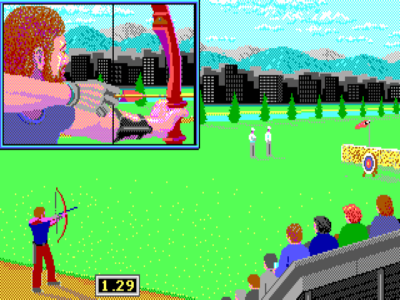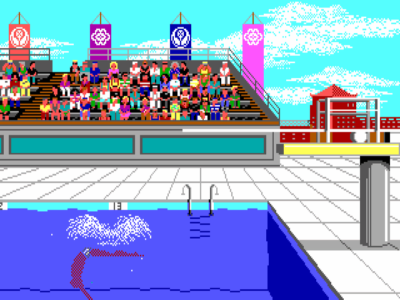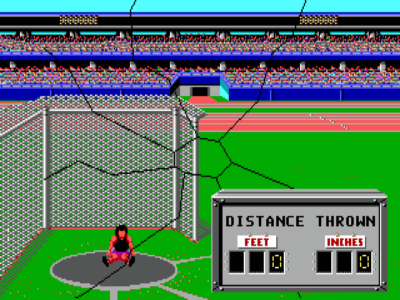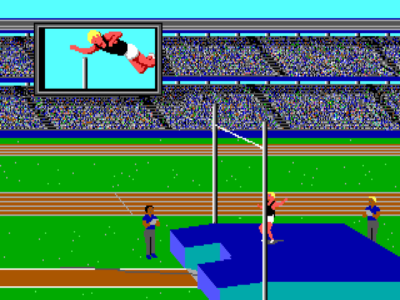
The Games: Summer Edition
Written by: Rik
Date posted: August 12, 2012
- Genre: Sport
- Developed by: Epyx
- Published by: Epyx
- Year released: 1988
- Our score: 4
Okay, so we’d better start with full disclosure here: The Games: Summer Edition doesn’t work properly. Well, at least, not for me, and not at the time of writing. There’s a glitch, you see, which causes the game to crash in DOSBox. It doesn’t reveal itself, though, until you attempt to start ‘The Games’ proper, hanging on the name/nationality screen and refusing to budge, and so if by any chance you happen to have spent several hours practising each event in turn before entering yourself into competition (as any good Olympian should), then you’ll find that time to have largely been wasted, given that you’ll never get the opportunity to test yourself against the best fake-computer athletes in the best fake-computer world, in fake-computer South Korea, circa fake-computer 1988.
So, while I do have previous encounters with the Atari ST version of the game to draw upon (as well as having access to the internet and YouTube in the present day) and feel pretty confident in declaring the competition mode little more than a stapling together of the eight separate events with one or two additional screens and animations, I must admit to you now, dear readers, that I can’t say for certain what it is like, as I have not experienced it for myself. If that makes me a charlatan in retro-game-reviewing land, then so be it: I did consider, as a gesture to the site’s integrity, not writing up this piece (other reasons include: laziness) but in the end, I figured that if you’re going to spend hours and hours struggling with an EGA and plip-plop sound athletics game, without entertainment being particularly forthcoming, well, gee-whizz, you need to have something to show it.

The main danger with archery is too much power – once you’ve pulled back too far, no amount of over-correction is going to save you.
And what I have to show for it is this: a humdrum run-through of the featured events, a quick word about the presentation, followed by a conclusion (the gist of which you might be able to guess from the number showing at the top of the screen). First, though, an introduction; and a quick rummage around in my dustbin of a brain brings forth vague memories (confirmed by moderate internet research) that developers Epyx were once fairly prolific in the area of releases with the word ‘Games’ in the title, bringing us various summer and winter compilations (as well as California Games) over the years, of which this particular title represents a comparatively modern vintage. It’s also worth pointing out that The Games: Summer Edition is not to be confused with The Games: Summer Challenge (although it is easily done) and there is no link between the two, other than the fact they cover summer athletics and have misleadingly-similar titles.
Let’s go through the events themselves, then, and, in a vague nod to planning and order, we’ll use the menu screen as our guide, moving anti-clockwise from the Olympic torch icon (which, as we already mentioned, brings the game to a crashing halt). Hurdles covers fairly familiar territory for long-time fans of this kind of thing: you build up speed by bashing buttons, and press another to jump at the appropriate time. Timing is particularly crucial here – if you’re slightly off you’ll stumble and lose time, but if you really get it wrong then you’ll fall and it’s game over (sadly neutralising my favoured tactic from Daley Thompson’s Decathlon of simply running through all the hurdles). The animation is slightly lurchy, making the timing more difficult to judge, but otherwise it all works well enough (and certainly the side-on perspective is preferable to the third-person, behind-the-athlete view used in Summer Challenge).
Next up is pole vault, another event during which you might expect some significant button bashing to take place. However, rather than hammering away at the keyboard to build up speed, here the run-up is more about rhythm. You’re presented with a view of your athlete running towards the camera, and you make him run faster by tapping the left and right keys in time with his left and right feet hitting the ground. The perspective then switches to a more traditional side-on view, at which point you need to press a sequence of buttons to lower the pole into the ground, manoeuvre your athlete into the air and then over the bar. It’s one of those events that can take an age to get the hang of, but then once you make sense of it all, success can be achieved fairly easily.
At this point we should probably mention that The Games: Summer Edition makes an appreciable effort to add comedy value to your failures. Pole vault is a good example – if you get the timing wrong, you can either end up breaking your pole or missing the jump altogether and simply running through like a madman. Other events do this too, and it’s good to see that more than one ‘you messed it up’ eventuality has been planned for in most cases, usually with amusing consequences, which does mitigate against the natural rage and embarrassment caused by repeated failure at an event.
Next, we come to archery, another decent event, and altogether more challenging than the idiot-proof recreation offered in Summer Challenge. Here, you’re required to judge power and wind speed as well as having to aim for the board with a wobbly target, and you’re much more likely to mess things up completely as a result, although on the other side of the coin, of course, it’s rather more satisfying when you succeed. For the Hammer Throw, we’re back to more conventional track and field fare, with the event requiring a gentle building of rhythm at the start, with the good-old combination of button bashing and a well-timed button press then following. It’s another fun event, with significant amusement value attached to either letting the hammer go at the wrong time, or not letting go at all.
At this point we get into slightly sticky territory with the gymnastics events, which are by some distance the most tricky to master. Despite having diligently obtained, and attempted to follow, some detailed instructions, I have to say that significant success in either the uneven parallel bars or the rings eluded me. Both seem to involve putting a sequence of moves together, with the rings adding an additional button bashing element to hold a position, but beyond that I couldn’t really get my head around either event, and had as much success with random button presses as when I attempted a deliberate strategy.
I guess it’s fair enough to try and include something slightly more technical, but without wanting to offend anyone, I’d contend that no-one cares enough about doing well at pretend gymnastics to comb through a series of diagrams in order to master these events. People who play games like this are fair-weather fans who only sustain their interest in athletics and related sports for a two-week period every four years; they want the technical mastery that real athletes have developed over years of training and practice to be distilled into something only moderately challenging at best. (Of course, it’s entirely possible that I’m just being shit.)
Diving is along similar lines, although in this case a modicum of understanding and success is possible, with practice, and there is considerable comedy mileage in your failures here, with even the most straightforward mistake (forgetting that you press down, not space, to execute a dive) causing hilarity as your diver walks, lemming-like, straight off the edge of the board. A nice touch is that feedback from the judges follows the scoring, so that you have some idea of what went wrong (unless of course it’s obvious to you already). On the negative side, the game does seem to have difficulty translating your key-presses into the precise move you want to do, and as a result it’s difficult to avoid the feeling that even your successes are down to luck as much as skilful execution.
That leaves us with the final event, velodrome sprint cycling, which is a curious beast, particularly if you’re ignorant of the nuances of the real-life event (which I am, for all of Team GB’s success). Evidently, the early parts of the race involve going quite slowly and doing very little, before going hell-for-leather in the last lap or so. There’s supposed to be some tactics and jostling in the slow part, although the latter seems destined to bring one of you sliding off your bike, and I’m not really sure how this was supposed to be realised here, and the racing (sprint?) element is back to your basic keyboard-hammering. It’s okay in that it’s vaguely fathomable, but it’s not one that’ll have you slapping your fingers on the desk for another go, either.
And, er, that’s it really. Eight events, three or four of which are quite good, a couple of okay-ish ones, and two that provoke nothing but head-scratching frustration (and, of course, a non-functioning competition mode). Presentation-wise, it’s 16-colour graphics and PC speaker all the way, and although that isn’t without charm, it doesn’t look or sound good when compared with the ST or Amiga versions. In fact, the whole thing might be a better bet on one of those other systems, provided you can get it to work and have access to a joystick. In one or two areas it does things better than Summer Challenge, but as an overall package, Mindspan’s effort is the better bet. Elsewhere, there are certainly other games of this vintage to try, but I reckon if you’re feeling nostalgic about the old button-bashers or joystick-wagglers, you should just go ahead and seek out the one you remember and you’ll probably have heaps more fun than by suffering through the next generation’s attempts at bringing subtlety to the genre.





 Posts
Posts